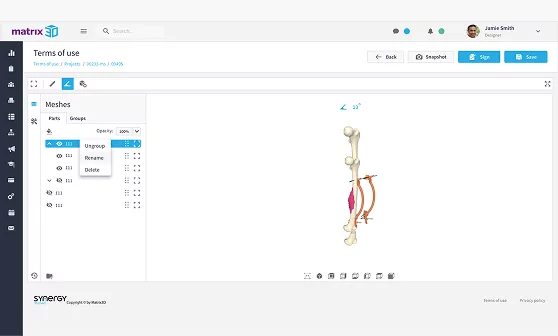Home purchase remains an integral part of the American Dream for 78% of Millenials, who, along with Gen Z, now account for most of the real estate demand. As homebuyers get younger, an increasing number of them embrace PropTech (property technology). 44% look for information about potential sales online before scheduling visits. Real estate companies unwilling to invest in PropTech, be it CRMs, virtual staging, or digital transactions, risk falling behind the competition and losing market share.
Investing in new technology in real estate takes a reliable partner with relevant expertise, like Inoxoft. We follow the latest PropTech trends and have over a decade of software development experience, including successful PropTech cases for visual solutions, amenity, and property management.
Let us introduce emerging technologies in real estate, such as blockchain, artificial intelligence (AI), and augmented reality (AR). We’ll cover their benefits and how businesses can outpace competitors with their help.
- Why Technology Matters in Real Estate
- How Technology is Changing the Real Estate Industry
- Key Market Segments in PropTech
- Technology in the Real Estate Industry
- Artificial Intelligence
- Machine Learning & Automating Home Valuation
- Customer Relationship Management Solutions
- HOA Management Software
- Blockchain
- Augmented Reality
- Cloud Integration
- Internet of Things
- Geolocation and Localization
- Digital Mortgages
- The Future of Real Estate Technology
- Consider Inoxoft Your Trusted Partner in Real Estate Development
- Property Management Software Development by Inoxoft
- Final Thoughts
Why Technology Matters in Real Estate
We live in a world where tech-savvy users set the course of business. They use technologies to satisfy almost all their needs and are a large market segment. In the wake of the pandemic, more people are shifting towards remote work, and these lifestyle changes affect the housing market. Despite the increase in interest rates, most Americans still dream of owning their own homes. As a result, the real estate and technology markets are booming. Between 2022 and 2024, the global PropTech market size went from $30.16 billion to $40.58 billion and is expected to triple by 2032. Here are some other critical industry-related facts, according to the US National Association of Realtors Technology Survey:
- The top three tech and real estate tools realtors use are social media (52%), customer relationship management (CRM) (32%), and local multiple listing software (MLS) (26%).
- Respondents named drones (35%), AI and ML (28%), 5G (26%), and cyber security (10%) among the emerging technology tools used in their real estate businesses.
- 30% of respondents admitted to using AI real estate technology trends once or twice per month. 55% were somewhat familiar with the technology.
- 59% of respondents were unfamiliar with blockchain, while 31% believed it would affect the real estate market within five years.
- Average monthly spending on PropTech solutions and other tools ranges between $50 and $500.
The impact of technology on real estate increased over the years since real estate companies realized the advantages technical solutions offer.
Read more: Benefits of using property management software
How Technology is Changing the Real Estate Industry
In 1981, the National Homebuying Survey found that newspaper ads were the most crucial information source after the real estate agents. In contrast, in 2020, 97% of homebuyers relied on the Internet to find their new homes. Here’s how technology has changed the real estate industry in the recent years:
- Property listing and search. While yard signs and newspaper listings were the primary tools of the past, now 76% of homebuyers use mobile devices to search for listings online. Typical buyers solely view online five out of the nine homes they consider. Aside from easy and convenient online listings, real estate agents use AI-powered MLS software to tailor search results to the buyers’ preferences.
- Property valuation. Instead of relying on arbitrary valuations, homeowners, homebuyers, and real estate agents can now utilize smart algorithms to establish market pricing. Machine learning (ML) and artificial intelligence (AI) account for various factors, from location and infrastructure to property conditions.
- Marketing. Social media has become the top lead-generating tool for real estate, followed by CRM, MLS sites, email newsletters, and listing aggregator sites. Despite their earlier popularity, digital ad campaigns, personal blogs, and business sites are less helpful in generating leads in the real estate market in 2024.
- Transaction management. Commercial real estate technology automates crafting offers, analyzing bids, and negotiating the final deal between sellers and buyers. Cloud technologies, machine learning, and blockchain are invaluable for the due diligence process and other legal challenges.
Key Market Segments in PropTech
- PropTech is a multi-billion dollar market with dozens of smaller niches. The most prominent ones include the following real estate technologies:
- Property search and listing platforms. 91% of real estate firms use property listings to attract potential homebuyers. In addition to traditional descriptions and photos, the newest real estate technology includes 3D tours using virtual or augmented reality.
- Property management software. With integrated platforms, homeowners and landlords automate routine tasks, including invoicing, accounting, and maintenance request management.
- Real estate CRMs. Many real estate firms still rely on texting, emails, and other traditional forms of communication. However, one in three have already adopted customer relationship management solutions to maximize leads and deals.
- Mortgage digital platforms. With the adoption of e-signature and online notary services throughout the pandemic, digital mortgages have become a staple of the real estate landscape.
- Real estate investment platforms. Thanks to location intelligence and data analytics advances, IDX platforms facilitate decision-making and help keep track of investment valuation in real-time.
Technology in the Real Estate Industry
The most common technology used in real estate is online visualizations of property. But here is the list of other technologies for real estate development that will shape the industry and quick insights on how to use technology in real estate.
Artificial Intelligence
How can AI and chatbots assist real estate businesses? Companies implementing AI technology to get reliable market forecasts and predictions of the future home’s value. Also, the technology simplifies the work for real estate agents and lets them focus on core operations. As a result, 49% of real estate businesses see cost reductions, while 63% of property companies claim revenue increases.
Let’s consider Zillow as an example of an AI-enhanced solution. Like social media algorithms that prioritize posts users interact with, it analyzes user activity and home preferences to speed up the search. Instead of combing through all the listings, users focus on the few most suitable houses. Natural language search is another recent addition to the Zillow toolset.
Machine Learning & Automating Home Valuation
28% of commercial real estate companies use machine learning in decision-making. For instance, companies utilize image recognition to identify pixel patterns in a photo so they can gather information on a home to categorize and calculate the home value more accurately.
ML algorithms examine many homes in the area. Thus, helps homeowners and real estate agents identify factors that might impact a home’s selling price. Also, technology helps to determine whether a remodeling project makes sense before putting the home on the market. The role of this disruptive technology in real estate during the home valuation process is to automate routine tasks and eliminate human mistakes.
Opendoor incorporated AI into its pricing algorithms in 2023. They analyze market trends, macroeconomic parameters, and home conditions to estimate the value. Moreover, evaluators adopt AI to decide if small renovations for turnkey housing could generate additional value for sellers or buyers.
Customer Relationship Management Solutions
According to NAR, 32% of real estate firms use customer relationship management software, and 27% of realtors use CRM software daily. The latter is another useful tool for the real estate business. It manages contacts, stores data, tracks leads, and keeps track of the progress. Real estate agents can have their online accounts to see all of their interactions with potential and current clients. They can make selections to send messages to different groups of people who can deal with them.
The market is full of ready-made CRM solutions. However, not all of them suit the real estate technology market, leading to adoption challenges. Most adopters face challenges with customization, third-party integration, and poor functionality. These issues drive real estate businesses to consider customized CRM development.
To learn more about the effect of CRM on real estate, check out our recent blog post.
HOA Management Software
HOA management software is a useful tool in accounting management and processing payment data. You can manage online portals, share documents, and orders related to work. Also, you will be able to track board members’ progress and bulk charges for assessments via the HOA database services. Also, with custom HOA management software, you can automate your management processes such as tracking due dates, monitoring board members, and store documents. And also integrate different relevant software (CMS, MLS, IDX, calendars, payment gateways, etc.)
All-in-one systems like PayHOA are gaining popularity as they automate and facilitate time-consuming tasks, including invoicing, accounting, and maintenance requests.
Blockchain
Companies can’t avoid emerging technologies; thus, blockchain remains among the real estate tech trends this year. 80% of real estate professionals believe that this technology will affect the industry significantly in the next 3-5 years. The value of blockchain technology in real estate is expected to reach $2.3 billion by 2025. Investors and homebuyers can save up to $30,000 on an average deal worth around $429,000.
Propy is one example of a blockchain-based offer and transaction management system in real estate. Unlike many paperless solutions, it’s transparent, secure, and fully protected from wire and title fraud.
Blockchain technology is used to store data and automate, accelerate, and track transactions. Also, you can be sure that all verified transactions are confidential and are available only to the network participants you choose. With blockchain, real estate agents can create smart contracts by digitizing information and storing it in an encrypted database. And transactions are made transparently and securely.
Augmented Reality
Another related technology in the real estate sector that allows clients to get the feeling of walking through your listing is AR. 70% of technology leaders believe it will outpace VR in adoption since it relies on smartphones, which most buyers already own (unlike VR headsets).
Computer-generated images are superimposed on a virtual simulation of the space. This technology allows agents to virtually stage listings so clients can change the look of a home and see how the property can work for them.
AirMeasure is a popular AR tool for instant sizing, which is also helpful in real estate. The app can visualize furniture within the room based on its dimensions or identify the best size of the TV for a wall in the new home.
Cloud Integration
Cloud computing is another disruptive technology, and real estate is happy to adopt it. It makes operations more efficient, whether renewing a lease with a renter or dealing with an internal business. Cloud technology has been employed for a while now for remote closings, electronic document signatures, and other operations that used to be carried out in person.
The smart building market, which relies heavily on cloud storage and computing, is valued at $117.42 billion in 2024 and is expected to grow at a CAGR of 21.8%. One example of this trend is the Smart-i-building by Wipro Limited. The solution running on Microsoft Azure increases space usage efficiency and reduces energy consumption to minimize the office buildings’ environmental footprint.
Internet of Things
The number of connected IoT gadgets increased by 16% in 2023 and exceeded 16 billion devices. IoT is among the leading technology real estate technology trends, retail, warehousing, shipping, manufacturing, and other markets. At a homeowner level, it can manage demand response programs, monitor energy consumption, and control heating and cooling. Commercial real estate gets the same benefits but at a much larger scale. Meanwhile, development and construction can use real-time monitoring to track progress, streamline communication, and optimize costs.
ABB Cylon BMS (building management system) is one example of an integrated IoT monitoring and management solution. It optimizes energy consumption and reduces the carbon footprint of buildings.
Geolocation and Localization
Geolocation, as one of the technology trends in real estate development, assists in searching for the exact property location, visualizing factors such as property data, county maps, flood zone maps, and soils to estimate the land value.
The location intelligence market exceeded $18 billion in 2023 and will continue to expand with a CAGR of 15.8% for the next decade. Its impact on commercial real estate is hard to overestimate, as companies like DataAppeal provide actionable location data based on investment goals. Analyzing data sets that include traffic, age, gender, etc., assists in identifying the best properties for real estate investors.
Digital Mortgages
As mentioned, Millennials and Gen Z are the bulk of homebuyers in 2024. They prioritize convenience, speed, and sustainability in every aspect of the real estate deal, including mortgages. Digital mortgages powered by e-signature (for example, by Adobe) and online notary services close the rate gap for buyers and lead to faster closing times for lenders and sellers.
The Future of Real Estate Technology
Now that we’ve discussed emerging technologies that are changing the market landscape let’s consider the future of real estate technology. Based on the current adoption rate, within three to five years, we will likely witness the following:
- Hyper-personalized homebuying experiences. Advanced AI algorithms will analyze homebuyers’ lifestyles and preferences and estimate their future needs. This way, they will match customers with the most suitable properties.
- Autonomous property management. A powerful combination of IoT, cloud processing, AI, and blockchain can take over the landlord or HOA functions, including tenant screening, rent collection, predictive and scheduled maintenance, and more.
- Property digital twins. A digital copy of the building augmented by the real-time data collected by IoT devices and processed in the cloud will boost decision-making. Digital twins will assist with predicting potential issues and scheduling maintenance or let them determine when to sell the asset.
- Optimized energy management. The green shift and the drive for sustainable housing will encourage smart building solutions to control and optimize energy consumption. Along with other sustainable tech in real estate, these solutions will dramatically reduce a property’s carbon footprint.
- Construction automation. Robotization, automation, and drone usage will significantly reduce the cost of commercial and residential construction. Besides, these technologies will increase its speed, ultimately lowering the costs for homebuyers.
Consider Inoxoft Your Trusted Partner in Real Estate Development
Inoxoft is a Real Estate development company that created top-notch software for clients from the United States to Australia. Our team provides a variety of services including.
- Real Estate CRM software
- Property rental management software
- Property management software
- Real Estate IDX technology integration
- MLS software development services
- Hoa software development services
Property Management Software Development by Inoxoft
It took our team of eight professionals six months to develop a property management platform with an IDX filter, attractive UI and UX design, and fast filter-based search. The Inoxoft development team integrated AWS, CMS, CSS3, Docker, Gulp.Js, HTML5, JavaScript, JQuery, MySQL, and PHP 7 solutions to create a platform with buyer, seller, and renter functionality.
Buyers and renters can sort the listings by specifying desired parameters, such as price, location, or square footage. Once users select the listings, the platform helps them arrange calls with real estate agents. Seller functionality includes a detailed form and contact with the realtors to prepare the property for listing.
The final product fulfilled the client’s needs and delivered a user-friendly property management experience, which ultimately refreshed the brand image and strengthened its positioning.
Get in touch with our experts to get all the insights on how information technology can strengthen your business.
Final Thoughts
The real estate technology trends mentioned above will influence the future of the industry. Machine learning and AI will customize buyer experiences, while augmented reality will envision potential homes with new furnishings. HOA and CRM solutions aren’t as flashy but offer invaluable automation benefits for homeowners and real estate firms. On top of that, location intelligence and digital mortgages make life easier for investors. If you want to explore this industry or consider investing in it, keep an eye on the innovative technologies that will emerge in the next few years.
If you want more insights into how technology is changing the real estate industry or wish to leverage emerging technologies to boost your real estate firm, contact us. We’ll schedule a consultation to address your business needs.
Frequently Asked Questions
How do I choose the right technology for my real estate business?
To choose the right technology, identify your primary challenge or business goal. For example, if your realtors fail to close deals after hosting open houses, augmented reality solutions can boost the number of deals. In contrast, integrating ML or AI into your listing catalog is your go-to choice if you want buyers to find suitable homes faster.
What are the challenges of implementing new technology in real estate?
Initial investment is the primary factor preventing the implementation of new technology in real estate. Other adoption challenges include insufficient employee training, resultant friction, and poor third-party software integration. Of course, choosing the wrong technology to address your business needs also hampers implementation efforts.
How can I measure the ROI of implementing real estate technology?
To measure the ROI of implementing real estate technology, identify the quantitative metric you will use. For instance, pick the overall cost of the properties your firm closes in a month. Analyze the numbers before and after the implementation of new technology and take the implementation cost into account. In most cases, you’ll need to wait at least six months to see a significant ROI.


































